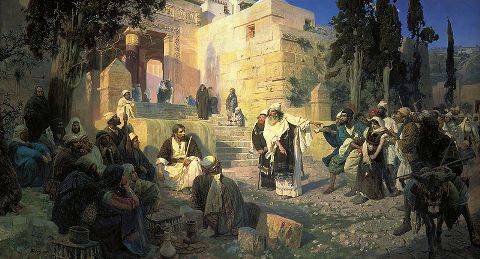What Yeshua Quoted

Jesus and the woman taken in adultery by Vasily Polenov (1844-1927). Image: Wikimedia Commons.
Note from the Editor: I wrote this note to Kevin: “In an article I was reading recently, the author says that Yeshua likely read and quoted from the Septuagint. While I have always known that as a possibility, I thought it was more likely that Yeshua used the original Hebrew which was later quoted in the Gospels as if it had come from the LXX. What can you tell me about this?”
The article I referenced was “What Bible Did Jesus Use?” by Henry Harbuck. Without reading Harbuck’s article, Kevin responded with the brief article that follows.
– Raul Mock
I do not believe anyone can say unequivocally what Yeshua quoted.
Having fled to Egypt as a boy, possibly to the area of Alexandria where there was a flourishing Jewish population and the home of the LXX, he was no doubt very familiar with the text. It had already been around a hundred years or so.
Here’s what I do know, which again, is not authoritative but hopefully will help.
The LXX was adopted so that all the Greek-speaking Hebrews would have a text they could understand. The Hellinization of the Jewish population had been going on for some time (think liberal theology versus more orthodox and mainstream). There were plenty of Jewish people in the known-world, just as there are today, who had never been taught the Hebrew language. There was a deep concern that if they did not get the Greek-speaking Jewish men (women likely were not allowed to read yet) into the Word of God, they would slip further and further into paganism. There are reports, in fact, that Hellenization had become so prominent, that surgeons would perform reverse circumcisions so the men could participate in the arenas without being “noticed,” (as the athletes commonly performed au natural).
So the LXX was created, if you will, to be an evangelical tool to the Hellenized Jewish community. It was never intended to replace the Hebrew scrolls read so fastidiously over the centuries. “For Moses has been preached in every city from the earliest times and is read in the synagogues on every Sabbath” (Acts 15:21).
In the synagogues, the Hebrew would have been the preferred text. As I’ve written elsewhere, there were offices such as the Overseer (Bishop) who made certain the text was read verbatim and the Targumim (translator), whose job it was to repeat the text in the local language for the sake of the non-Hebrew speaking Jewish population as well as the God-fearing gentiles. If it was being read from the LXX, then there was no real need for a Targum, yet that office did exist in the synagogues.
Category: Biblical Studies, Winter 2015


